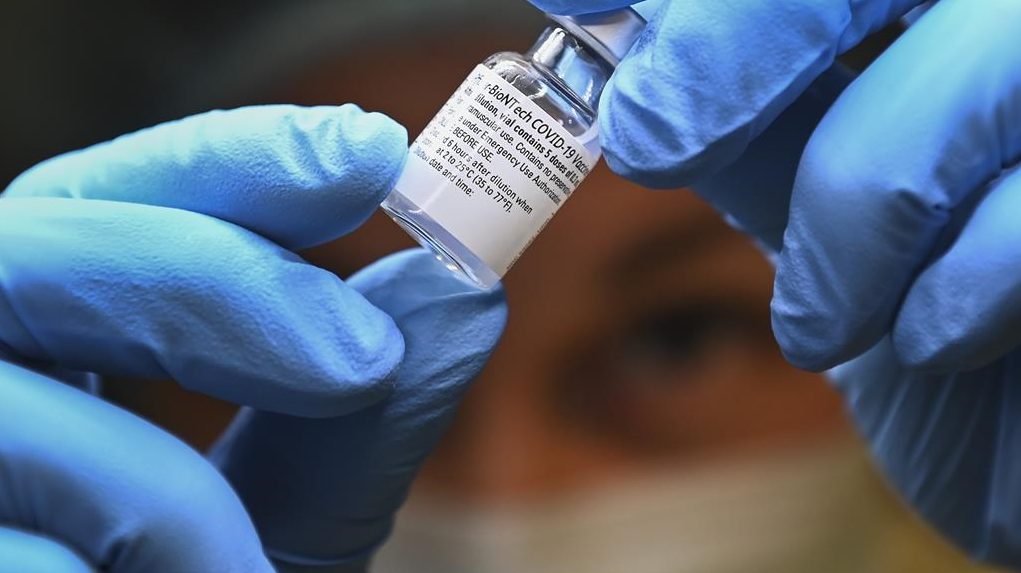
A single jab of COVID-19 vaccine appears to be highly effective, which could allow better use of scarce supplies and see more people immunized, federal and Quebec health officials said on Thursday.
Health authorities in Ottawa said experts were looking at whether one shot of the Pfizer-BioNTech vaccine could be almost as good as the recommended two.
Canada’s deputy chief public health officer, Dr. Howard Njoo, called the data in a new Canadian-authored study compelling.
Writing in the New England Journal of Medicine, two doctors say U.S. data indicate the vaccine to be 92 per cent effective against COVID-19 two weeks after just one dose. Original data suggested a first dose only offered about 52 per cent protection.
Co-author Dr. Gaston De Serres, with the Institut national de sante publique du Quebec, said preliminary data indicated a single dose given to health-care workers and long-term care residents in the province had been 80 per cent effective within two or three weeks.
De Serres and Dr. Danuta Skowronski, with the British Columbia Centre for Disease Control, said delaying second doses could allow more of the most vulnerable to be protected by giving them at least one shot.
Vaccine makers recommend the second shot be given within 21 or 28 days from the first one, depending on the vaccine. A federal committee has recommended a delay of up to 42 days. The Quebec government, however, says it wants to give the second shot within 90 days.
Dr. Nicholas Brousseau, chair of Quebec’s immunization committee, said that 90-day number comes from the provincial government, not the committee, which isn’t recommending a specific delay.
Brousseau said the committee is recommending Quebec give a single dose to all members of six priority groups before anyone receives a second shot. The priority groups include health-care workers, residents of long-term care and retirement homes, as well as people over 70 years old.
“That’s the way to decrease the number of hospitalizations and prevent deaths,” he said. “At the moment, we think that we have to favour a longer interval rather than a short interval to optimize the public health impact of the vaccine.”
Brousseau said that could change if there are signs the level of protection offered by the vaccine is declining.
Dr. Sophie Zhang, who oversees 15 long-term care centres in Montreal, said the steep decline of new COVID-19 infections in the long-term care homes may be an early sign Quebec’s vaccination strategy is working – but other factors are also likely contributing.
Zhang, who supports the province’s vaccine strategy, said “vaccination is part of the package” that has led to the decline in the number of new cases in long-term care.
“What we’re seeing is a combination of several things in synergy and really working together to decrease the cases and mortality,” she said in a recent interview. The lockdown and curfew, she added, have also contributed to the decline in the overall number of active infections in Quebec.
Joyce Shanks, a member of the Family Advocacy Committee at Maimonides, the long-term care centre where the first doses of vaccine were administered in Montreal, says she feels like the government is conducting an experiment on people who thought they would get two doses of vaccine within the time frame recommended by vaccine makers.
Her father, who lives at Maimonides, received one dose of vaccine more than 60 days ago but has not received the second. She worries the protection offered by a single dose won’t last.
“We’re holding our breath; we’re not breathing a sigh of relief,” she said Wednesday.
Across Canada, COVID-19 has now killed 21,435 people out of 834,000 infections. Almost 33,000 people are currently infected, according to federal data.
Ontario reported another 44 pandemic-related deaths to bring its total to 6,773 and Quebec saw 10 more fatalities, bringing its total to 10, 268.
“It is important to remember that the vast majority of Canadians remain susceptible to COVID-19,” the Public Health Agency of Canada said.








